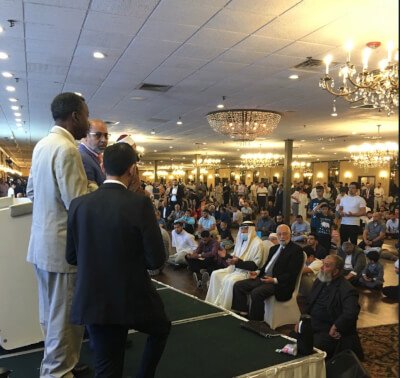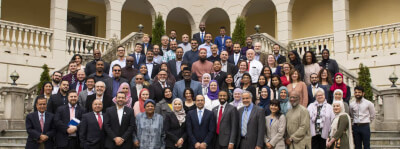Tlaib candidacy in Michigan offers insight into community challenges
Saudi Gazette Newspaper, November 03, 2013
By Ray Hanania
Rashida Tlaib was the first Palestinian Muslim woman to be elected to the Michigan State House in 2008 in a district outside of Detroit. It was a monumental achievement considering she is now only one of two Muslim women to hold legislative office in any of the 50 state general assemblies in the United States.
The Greater Detroit region has one of the largest concentrated American Arab communities in the country. Despite some successes, not enough Arabs have been elected to public office there.
Tlaib’s ability to overcome the challenges facing Arabs in strong and weak communities is notable. State legislatures are similar to the US Congress, consisting of representatives and senators. They draft laws in Michigan the way Congress drafts national laws. Michigan has 110 State House members and 38 State Senate members, an exclusive club. That’s why it is so troubling to see typical inter-Arab community conflicts undermine her future.
Tlaib is no stranger to controversy. She is bright – I have interviewed her on my former radio show. Based on many years of my political and media experience, I see her as being one of the most successful in mastering the art of politics, which is challenging to most American Arabs.
It is fascinating that Tlaib was elected in the 12th district which has so few Arab voters. She did what other Arab candidates to public office continue to fail to do, with the only exception being the Lebanese community which holds 90 percent of the elective Arab offices because of their longer American roots.
Michigan’s 12th Legislative District is 40 percent Hispanic, 30 percent white, 25 percent African American and only two percent Arab. Tlaib won office several times because she did what many other Arab candidates failed to do. She mastered collaboration with other voting constituencies. She did not rely on her ethnic community to win, but instead by winning support among Hispanic, black and white voters. That sounds easy, but it’s not.
Anti-Arab racism in the post-Sept. 11, 2001 world remains difficult to overcome. Yet she did it. That’s why it is so troubling to see how the Arab community in the Greater Detroit region has imploded in conflict over Tlaib.
Arabs have to admit that our community does have gender-driven challenges. Despite what we say publicly, too many Arab men have problems with Arab women achievers. It’s not driven by Islamic or Christian Arab religious belief, but rather by old-fashioned male arrogance.
Arab men have been struggling in America with very limited success. So when Arab men see Arab women succeed, they tend to undermine them.
It happened in Chicago in the 1980s when the first Arab woman, Amna Mustafa was appointed to the Chicago Board of Education. Her appointment so upset the Arab male community, which represented more than 90 percent of Arab voters, that there were open campaigns to replace her. Chicago mayors have been frustrated by the divisiveness of the Arab community and instead of replacing her with another Arab, they chose from another ethnic group with less internal problems.
Last month, Tlaib was among a small group of Arab women who accused the former Midwest Director of the American Arab Anti-Discrimination Committee, Imad Hamad, of having engaged in sexual harassment. The charges were based on incidents that were years old. They were not recent. But because of the Arab community’s perceptions about the abuse of women, they were quickly embraced against Hamad.
I have known Hamad for more than 30 years. In the early 1980s, while I was a Chicago political reporter, he had immigrated to America but was singled out by the INS for deportation. I wrote several columns addressing the imbalance in how the INS targeted and deported Arabs while turning their backs on immigration violations in other ethnic communities. We weren’t just being held to a higher standard. Arabs were being singled out and punished for their political views on Israel.
The Tlaib and Hamad controversy has divided the Arab community in Detroit more than it was already divided. Despite the perception of having more political clout in Detroit than Arabs have in any other city, their clout is limited by their intense internal battles.
ADC National sided with Hamad, declaring they could find no evidence that the allegations were true. Sexual harassment charges by women against men are difficult to dissect. Too often, men are judged to be guilty even without evidence. Despite the clean bill from ADC, Hamad was forced to step down. And, despite ADC’S poor record in championing civil rights cases, ADC is a “civil rights” organization. The Tlaib case casts a cloud over their credibility.
Some ADC critics had already launched a rival civil rights group. That’s what Arabs often do. You launch an effort, and five others will launch five rival efforts just to stop you. In the Arab community, fighting civil rights is tragically often more about politics than social justice.
I stand by my support of Imad Hamad. I don’t believe he is guilty of the charges. Sexual harassment is more than just an accusation.
But, I also stand with Tlaib whose election to the Michigan State Senate is critical to the long-term well-being of the Arab community.
We need to break the glass ceiling in America that prevents Arabs from sharing in the benefits of American life, from grants to holding public office. If anyone is going to break that glass ceiling, I think it is Tlaib.
– Ray Hanania is a former Chicago City Hall political reporter and columnist. He is president and CEO of Urban Strategies Group political consultants. He can be reached at http://www.TheMediaOasis.com or follow him on Twitter @RayHanania
Originally published in the Saudi Gazette Newspaper. Click here
Related articles


- Israelisnipers shooting and killing hospital workers in Gaza - December 11, 2023
- CAIR Condemns Israeli Executions of Wounded, Unarmed Palestinian in West Bank - December 11, 2023
- Arab and Muslim American voters face a “simple choice” between Biden’s inhumanity and Trump’s edgy politics - December 9, 2023
























